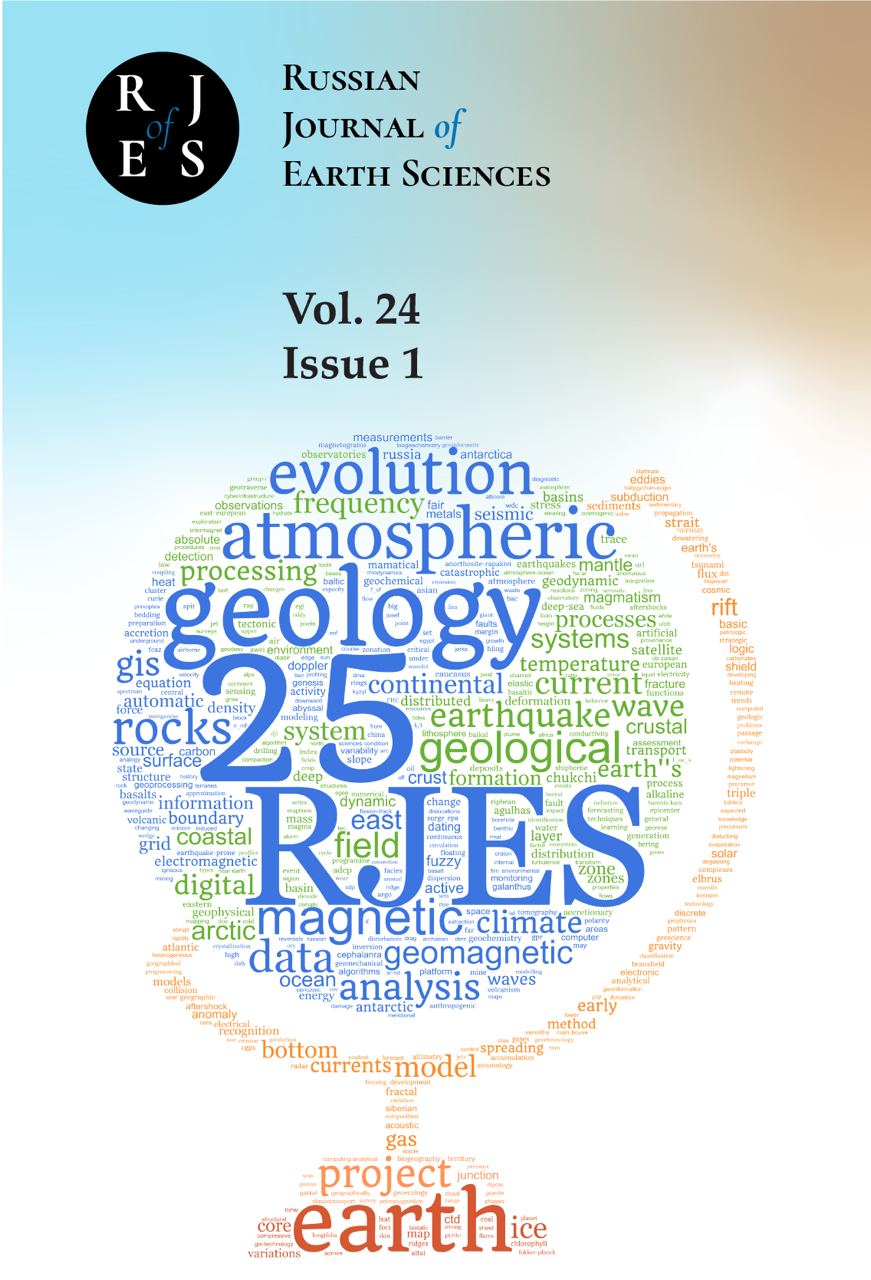Moscow, Russian Federation
UDC 55
CSCSTI 37.25
Russian Classification of Professions by Education 05.00.00
Russian Library and Bibliographic Classification 26
Russian Trade and Bibliographic Classification 63
BISAC SCI SCIENCE
This is a review paper on generation of internal tides in the global ocean based on literature data and publications of the author. Energy fluxes of semidiurnal internal tide generation over submarine ridges were estimated based on modeling and measurements on moorings in many regions of the ocean. Data from 4000 moorings during a period of 50 years are considered. Regions of intense generation of internal tides are indicated. They are related to several underwater oceanic ridges. Energy fluxes from submarine ridges greatly exceed those from the continental slopes because generally the currents of the barotropic tide are parallel to the coastline. If the barotropic tide currents are normal to the ridge, they generate strong internal tides. They account approximately for one fourth of the energy losses of the barotropic tide. Decay of internal tide during propagation was estimated based on the data from lines of moorings located normal to the ridges. Model simulations and moored measurements result in a global map of semidiurnal internal tide amplitudes
Internal tides, bottom topography, overflows, submarine ridges, tidal energy dissipation
1. Alford, M. H., T. Peacock, J. A. MacKinnon, J. D. Nash, M. C. Buijsman, L. R. Centurioni, S.-Y. Chao, M.-H. Chang, D. M. Farmer, O. B. Fringer, K.-H. Fu, P. C. Gallacher, H. C. Graber, K. R. Helfrich, S. M. Jachec, C. R. Jackson, J. M. Klymak, D. S. Ko, S. Jan, T. M. S. Johnston, S. Legg, I.-H. Lee, R.-C. Lien, M. J. Mercier, J. N. Moum, R. Musgrave, J.-H. Park, A. I. Pickering, R. Pinkel, L. Rainville, S. R. Ramp, D. L. Rudnick, S. Sarkar, A. Scotti, H. L. Simmons, L. C. St. Laurent, S. K. Venayagamoorthy, Y.-H. Wang, J. Wang, Y. J. Yang, T. Paluszkiewicz, and T.-Y. (David) Tang (2015), The formation and fate of internal waves in the South China Sea, Nature, 521(7550), 65-69, https://doi.org/10.1038/nature14399.
2. Baines, P. G. (1982), On internal tide generation models, Deep Sea Research Part A. Oceanographic Research Papers, 29(3), 307-338, https://doi.org/10.1016/0198-0149(82)90098-X.
3. Barber, N. F. (1963), The directional resolving power of an array of wave detectors, in Ocean Wave Spectra, pp. 137-150, Prentice Hall, NY, Engelwood Cliffs.
4. Bell, T. H. (1975), Topographically generated internal waves in the open ocean, Journal of Geophysical Research, 80(3), 320-327, https://doi.org/10.1029/JC080i003p00320.
5. Bockel, M. (1962), Travaux oceanographiques de l’"Origny" a Gibralter, in Campagne Intemationale 15 Mai - 15 Juin 1961. I. Partie: Hydrologic dans le deroit, pp. 325-329, Cahiers Oceanographie.
6. Boyce, F. M. (1975), Internal waves in the Straits of Gibraltar, Deep Sea Research and Oceanographic Abstracts, 22(9), 597-610, https://doi.org/10.1016/0011-7471(75)90047-9.
7. Briscoe, M. G. (1975), Preliminary results from the trimoored internal wave experiment (IWEX), Journal of Geophysical Research, 80(27), 3872-3884, https://doi.org/10.1029/JC080i027p03872.
8. Bryden, H. L., J. Candela, and T. H. Kinder (1994), Exchange through the Strait of Gibraltar, Progress in Oceanography, 33(3), 201-248, https://doi.org/10.1016/0079-6611(94)90028-0.
9. Cairns, J. L., and E. C. LaFond (1966), Periodic motions of the seasonal thermocline along the southern California coast, Journal of Geophysical Research, 71(16), 3903-3915, https://doi.org/10.1029/JZ071i016p03903.
10. Cartwright, D. E. (1977), Oceanic tides, Reports on Progress in Physics, 40(6), 665-708, https://doi.org/10.1088/0034-4885/40/6/002.
11. Cummins, P. F., J. Y. Cherniawsky, and M. G. G. Foreman (2001), North Pacific internal tides from the Aleutian Ridge: Altimeter observations and modeling, Journal of Marine Research, 59(2), 167-191, https://doi.org/10.1357/002224001762882628.
12. Egbert, G. D., and S. Y. Erofeeva (2002), Efficient Inverse Modeling of Barotropic Ocean Tides, Journal of Atmospheric and Oceanic Technology, 19(2), 183-204, https://doi.org/10.1175/1520-0426(2002)0192.0.CO;2.
13. Egbert, G. D., and R. D. Ray (2000), Significant dissipation of tidal energy in the deep ocean inferred from satellite altimeter data, Nature, 405(6788), 775-778, https://doi.org/10.1038/35015531.
14. Egbert, G. D., and R. D. Ray (2001), Estimates of M2 tidal energy dissipation from TOPEX/Poseidon altimeter data, Journal of Geophysical Research: Oceans, 106(C10), 22,475-22,502, https://doi.org/10.1029/2000JC000699. EDN: https://elibrary.ru/YKROEC
15. Egbert, G. D., and R. D. Ray (2003), Semi-diurnal and diurnal tidal dissipation from TOPEX/Poseidon altimetry, Geophysical Research Letters, 30(17), https://doi.org/10.1029/2003GL017676.
16. Fang, Y., Y. Hou, and Z. Jing (2015), Seasonal characteristics of internal tides and their responses to background currents in the Luzon Strait, Acta Oceanologica Sinica, 34(11), 46-54, https://doi.org/10.1007/s13131-015-0747-z. EDN: https://elibrary.ru/CKLYYC
17. Farmer, D. M., and L. Armi (1988), The flow of Atlantic water through the Strait of Gibraltar, Progress in Oceanography, 21(1), 1-103, https://doi.org/10.1016/0079-6611(88)90055-9.
18. Garrett, C. (2003), Internal Tides and Ocean Mixing, Science, 301(5641), 1858-1859, https://doi.org/10.1126/science.1090002. EDN: https://elibrary.ru/GPCFFB
19. Garrett, C., and E. Kunze (2007), Internal Tide Generation in the Deep Ocean, Annual Review of Fluid Mechanics, 39(1), 57-87, https://doi.org/10.1146/annurev.fluid.39.050905.110227. EDN: https://elibrary.ru/LQZRMN
20. Garrett, C., and W. Munk (1972), Space-Time scales of internal waves, Geophysical Fluid Dynamics, 3(3), 225-264, https://doi.org/10.1080/03091927208236082.
21. Hibiya, T. (2004), Internal Wave Generation by Tidal Flow over a Continental Shelf Slope, Journal of Oceanography, 60(3), 637-643, https://doi.org/10.1023/B:JOCE.0000038356.45342.6c.
22. Holloway, P. E., and M. A. Merrifield (2003), On the spring-neap variability and age of the internal tide at the Hawaiian Ridge, Journal of Geophysical Research: Oceans, 108(C4), https://doi.org/10.1029/2002JC001486.
23. Huan Lee, I., Y. Wang, Y. Yang, and D. Wang (2012), Temporal variability of internal tides in the northeast South China Sea, Journal of Geophysical Research: Oceans, 117(C2), https://doi.org/10.1029/2011JC007518.
24. Jan, S., R.-C. Lien, and C.-H. Ting (2008), Numerical study of baroclinic tides in Luzon Strait, Journal of Oceanography, 64(5), 789-802, https://doi.org/10.1007/s10872-008-0066-5. EDN: https://elibrary.ru/RPEFCN
25. Johnston, T. M. S., M. A. Merrifield, and P. E. Holloway (2003), Internal tide scattering at the Line Islands Ridge, Journal of Geophysical Research: Oceans, 108(C11), https://doi.org/10.1029/2003JC001844.
26. Kantha, L. H., and C. C. Tierney (1997), Global baroclinic tides, Progress in Oceanography, 40(1-4), 163-178, https://doi.org/10.1016/S0079-6611(97)00028-1.
27. Kerry, C. G., B. S. Powell, and G. S. Carter (2016), Quantifying the Incoherent M2 Internal Tide in the Philippine Sea, Journal of Physical Oceanography, 46(8), 2483-2491, https://doi.org/10.1175/JPO-D-16-0023.1.
28. Krauss, W. (1966), Interne Wellen, Gebrüder Borntraeger.
29. LaFond, E. C. (1961), The isotherm follower, Journal of Marine Research, 19(1), 33-39.
30. LeBlond, P. H., and L. A. Mysak (Eds.) (1978), Waves in the Ocean, Elsevier.
31. Lee, W. H. K., and C. S. Cox (1966), Time variation of ocean temperatures and its relation to internal waves and oceanic heat flow measurements, Journal of Geophysical Research, 71(8), 2101-2111, https://doi.org/10.1029/JZ071i008p02101.
32. Lozovatsky, I. D., E. G. Morozov, and H. J. S. Fernando (2003), Spatial decay of energy density of tidal internal waves, Journal of Geophysical Research: Oceans, 108(C6), https://doi.org/10.1029/2001JC001169 EDN: https://elibrary.ru/OQDXME
33. Mercier, M. J., L. Gostiaux, K. Helfrich, J. Sommeria, S. Viboud, H. Didelle, S. J. Ghaemsaidi, T. Dauxois, and T. Peacock (2013), Large-scale, realistic laboratory modeling of M2 internal tide generation at the Luzon Strait, Geophysical Research Letters, 40(21), 5704-5709, https://doi.org/10.1002/2013GL058064. EDN: https://elibrary.ru/SSVOZX
34. Morozov, E. G. (1988), Generation of internal tides over submarine ridges, Oceanological Researches, 41, 55-67 (in Russian).
35. Morozov, E. G. (1990), Geographical variability of internal waves, Oceanological Researches, 43, 48-68 (in Russian).
36. Morozov, E. G. (1995), Semidiurnal internal wave global field, Deep Sea Research, 42(1), 135-148.
37. Morozov, E. G. (2006), Internal Tides. Global field of internal tides and mixing caused by internal tides, in Waves in Geophysical Fluids, pp. 271-332, Springer, Wein, New York.
38. Morozov, E. G. (2018), Oceanic Internal Tides: Observations, Analysis and Modeling, Springer International Publishing, https://doi.org/10.1007/978-3-319-73159-9. EDN: https://elibrary.ru/YCLNOH
39. Morozov, E. G., and V. I. Vlasenko (1996), Extreme tidal internal waves near the Mascarene ridge, Journal of Marine Systems, 9(3-4), 203-210, https://doi.org/10.1016/S0924-7963(95)00042-9. EDN: https://elibrary.ru/LDTDMB
40. Morozov, E. G., K. Trulsen, M. G. Velarde, and V. I. Vlasenko (2002), Internal Tides in the Strait of Gibraltar, Journal of Physical Oceanography, 32(11), 3193-3206, https://doi.org/10.1175/1520-0485(2002)0322.0.CO;2.
41. Munk, W. H. (1966), Abyssal recipes, Deep Sea Research and Oceanographic Abstracts, 13(4), 707-730, https://doi.org/10.1016/0011-7471(66)90602-4.
42. Munk, W. H., and C. Wunsch (1998), Abyssal recipes II: energetics of tidal and wind mixing, Deep Sea Research Part I: Oceanographic Research Papers, 45(12), 1977-2010, https://doi.org/10.1016/S0967-0637(98)00070-3. EDN: https://elibrary.ru/ACLLAP
43. Nansen, F. (1902), The Oceanography of the North Polar BasinNorwegian North Polar Expedition 1893 - 1896 : scientific results, vol. 9, Longmans and Green.
44. Niwa, Y., and T. Hibiya (2004), Three-dimensional numerical simulation of M2 internal tides in the East China Sea, Journal of Geophysical Research: Oceans, 109(C4), https://doi.org/10.1029/2003JC001923.
45. Orr, M. H., and P. C. Mignerey (2003), Nonlinear internal waves in the South China Sea: Observation of the conversion of depression internal waves to elevation internal waves, Journal of Geophysical Research: Oceans, 108(C3), https://doi.org/10.1029/2001JC001163
46. Phillips, O. M. (1977), The Dynamics of the Upper Ocean, ii ed., Syndics of the Cambridge University Press, England.
47. Ramp, S. R., T. Y. Tang, T. F. Duda, J. F. Lynch, A. K. Liu, C.-S. Chiu, F. L. Bahr, H.-R. Kim, and Y.-J. Yang (2004), Internal Solitons in the Northeastern South China Sea Part I: Sources and Deep Water Propagation, IEEE Journal of Oceanic Engineering, 29(4), 1157-1181, https://doi.org/10.1109/JOE.2004.840839. EDN: https://elibrary.ru/LWFYJX
48. Sjöberg, B., and A. Stigebrandt (1992), Computations of the geographical distribution of the energy flux to mixing processes via internal tides and the associated vertical circulation in the ocean, Deep Sea Research Part A. Oceanographic Research Papers, 39(2), 269-291, https://doi.org/10.1016/0198-0149(92)90109-7.
49. Summers, H. J., and K. O. Emery (1963), Internal waves of tidal period off Southern California, Journal of Geophysical Research, 68(3), 827-839, https://doi.org/10.1029/JZ068i003p00827.
50. Tareev, B. A. (1966), Dynamics of internal gravity waves in a continuously stratified ocean, Izvestiya, Academy of Sciences, USSR. Atmospheric and Oceanic Physics, 2(10), 1064-1075.
51. Torgrimson, G. M., and B. M. Hickey (1979), Barotropic and Baroclinic Tides over the Continental Slope and Shelf off Oregon, Journal of Physical Oceanography, 9(5), 945-961, https://doi.org/10.1175/1520-0485(1979)0092.0.CO;2.
52. Wunsch, C. (1975a), Deep ocean internal waves: What do we really know?, Journal of Geophysical Research, 80(3), 339-343, https://doi.org/10.1029/JC080i003p00339.
53. Wunsch, C. (1975b), Internal tides in the ocean, Reviews of Geophysics, 13(1), 167-182, https://doi.org/10.1029/RG013i001p00167.
















